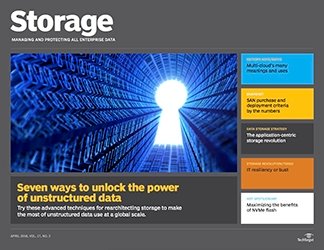PRO+ Premium Content/Storage
Access your Pro+ Content below.
A multi-cloud strategy provides more options and headaches

This article is part of the Storage issue of April 2018, Vol. 17, No. 2
You don't hear much talk of the cloud anymore. Sure, everyone is talking about clouds. But we no longer consider cloud one large, homogenous entity under the banner of the cloud. We've come to understand that all clouds are different, whether they're hosted by the likes of Amazon, Microsoft or Google or on premises by IT staffs. Each cloud has its strengths and weaknesses. Now the talk is of multiple clouds, or multi-cloud for short. IT no longer investigates how it can use the cloud, but how it can best take advantage of the various cloud options available to hone a multi-cloud strategy. (The exception is Amazon, of course, which wants the world to think AWS is the only cloud that matters.) A multi-cloud focus is a good thing, because it makes people realistic about the value of clouds. But like all new technology buzzwords, it can be confusing. When storage vendors talk multi-cloud strategy -- and storage vendors are all talking a lot about multi-cloud these days -- what exactly do they mean? Multi-cloud meanings One thing to ...
Features in this issue
-
Learn storage techniques for managing unstructured data use
Rearchitect storage to maximize unstructured data use at the global scale for larger data sets coming from big data analytics and other applications.
-
SAN purchase and deployment criteria by the numbers
Capacity and application needs drive businesses to deploy new storage area network systems, while criteria such as number of LUNs and multipathing are key to purchasing decisions.
Columns in this issue
-
A multi-cloud strategy provides more options and headaches
The days of the cloud as a single, homogenous entity are long gone. Going forward, you'll likely have a multi-cloud storage strategy and work with multiple service providers.
-
Want IT resiliency? Look to both security and disaster recovery
Security, protection from hackers and ransomware, disaster preparedness and disaster recovery are all means to the goal of resilient IT infrastructure and business processes.
